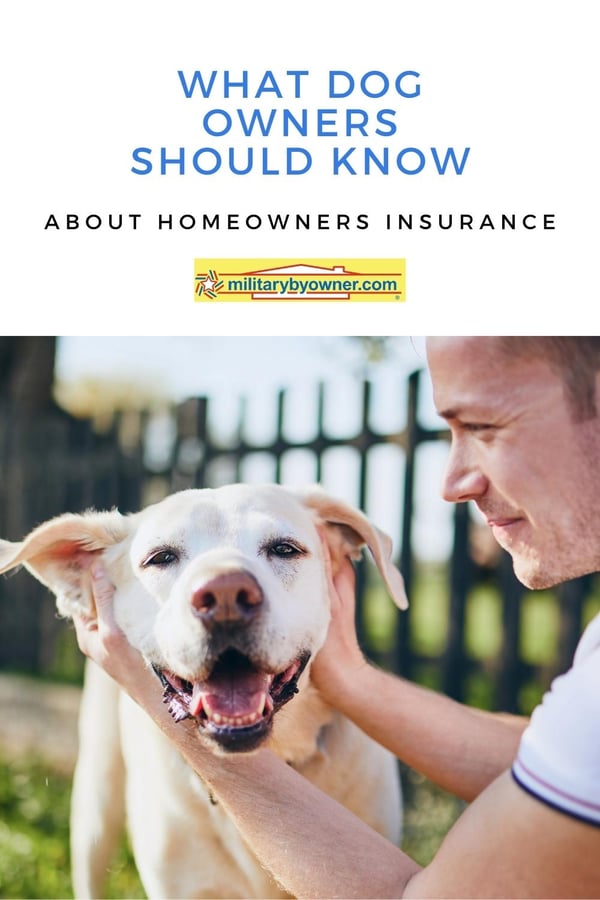What Dog Owners Should Know About Homeowners Insurance
One of the few joyful outcomes of the pandemic’s stay-at-home and work-from-home orders was the clearing of animal shelters and the uptick of homeless dog adoptions across the country. With more time on their hands and love to give, families introduced dogs into their homes and neighborhoods at a record pace.
With the excitement of adding a new member to the family, it’s easy to forget that taking on this responsibility could require adjustments to your homeowners insurance. Or, if you’ve never owned a dog, it’s probably never crossed your mind to talk with your insurance provider to find out if coverage is required.
To be on the safe side, check your current policies and prepare to make adjustments. If an incident occurs and your homeowners insurance does not include dog liability, the out-of-pocket costs and potential lawsuits could be devastating. Here’s why adequate homeowners insurance is so important.

Photo from Canva
Why do homeowners need to worry about liability as a dog owner?
The American Veterinary Medical Association reports that:
"4.5 million people are bitten by dogs each year in the United States, and more than 800,000 receive medical attention for dog bites, according to the U.S. Centers for Disease Control (CDC). At least half of those bitten are children.
Here are more dog bite facts:
- Almost 1 in 5 people bitten by dogs require medical attention.
- Children are the most common victims of dog bites and are far more likely to be severely injured.
- Most dog bites affecting young children occur during everyday activities and while interacting with familiar dogs."

Photo from Canva
While it’s widely agreed that most of these bites are preventable with advanced education—there are even dedicated dates in April each year to promote National Dog Bite Prevention Week— the number of incidents and their payouts paint an expensive picture.
This is what the Insurance Information Institute reports on dog bite liability:
“The average cost per claim increased 31.7 percent in 2022 to $64,555 from $49,025 in 2021. The average cost per claim nationally has risen 131.7 percent from 2013 to 2022, due to increased medical costs as well as the size of settlements, judgments and jury awards given to plaintiffs, which are trending upwards.”
These numbers make a case for adequate liability coverage within your homeowners insurance. Your well-intentioned dog rescue could become very expensive if you're not prepared.
What pet damage is covered by homeowners insurance?
The majority of policies focus on liability coverage, meaning the insurance will help pay if your dog bites someone or damages their property. If an incident occurs, an investigation to prove liability is performed to reveal who is liable.
There are documented cases when a dog bite was provoked, and the homeowner wasn’t held liable. However, if the dog was at fault, policy coverage typically includes medical expenses, legal fees, and payment for the victim’s lost wages due to the injury.
Liability limits usually range from $100,000 to $300,000. The homeowner is culpable for the remaining costs if the settlement exceeds that amount. It’s worth noting that homeowners policies do not cover the damage a dog might make on your own house: chewed drywall or destroyed personal property, such as a couch.
 Photo from Canva
Photo from Canva
Banned Breeds and Homeowners Insurance
It’s not uncommon for military families to buy a home if they own dogs frequently placed on banned breed lists. The options for rental homes on and off base are significantly reduced, so a home purchase, including the necessary homeowners insurance, becomes the best solution.
Learn more details in our post, Dog Breed Restrictions for On-Base Military Housing.
Did you know that, in some states, insurance providers can deny coverage to homeowners who own dogs on a banned breed list or have a history of biting? While most states legislate against this discrimination, some banned breeds may be considered for coverage on a case-by-case basis. Owners may be asked to have training documentation sent to the policy provider. Dogs not on a traditional banned breed list are usually covered without in-depth documentation.
According to ValuePenguin, State Farm and USAA insurance companies are dog friendly and consider the personal history of the dog instead of the breed, but they could charge more for the coverage.
State laws and policies vary across the country; reviewing your policy before taking on a new dog is imperative.
Photo from Canva
Here’s a look at dog breeds often denied coverage or held to a higher premium cost.
- Akita
- Alaskan Malamute
- Cane Corso
- Chow Chow
- Doberman Pinscher
- German Shepherd
- Great Dane
- Mastiffs
- Pit Bull Terriers
- Presa Canario
- Rottweiler
- Siberian Husky
- Staffordshire Bull Terrier
- Wolf Hybrids
If one of these breeds is part of your family, and your existing policy doesn’t cover their liability, comparison shop with other companies. Each has its own set of standards. Or, you may find success in purchasing dog-specific liability insurance or umbrella liability coverage.
Renters Insurance Coverage for Dogs
Most homeowners insurance information is the same for renters who own dogs, but reviewing a renters policy before purchasing is always wise. They don’t necessarily include liability for dog bites and could require more insurance coverage.
In competitive rental markets, an insurance policy on a dog often offers an advantage over other applicants vying for the same home—landlords like to avoid as much risk as possible.
 Photo from Canva
Photo from Canva
Are other pets covered?
If you own an exotic pet, you might need an insurance policy for animals that fall under the exotic pet category. There’s a resource insurance providers use, the Exotic Pet Species Index, to help determine if your exotic animal is covered.
Want to live with an exotic pet in military housing? Learn more: Is Your Exotic Pet Allowed in Military Housing?
As you might guess, housing tigers and monkeys isn’t covered under a typical policy. You’ll need to purchase a policy explicitly written for exotics. Expect high premiums and the highest liability option amount. Exotic owners should also note that many states ban ownership of these animals altogether, and liability insurance will not be available.
Pets are an important part of family life, especially for military families who derive continuity and comfort from their dogs while moving from home to home. Protect yourself and their well-being with homeowners insurance suited for your situation.
Need more information about caring for your pets while in the military? MilitaryByOwner has resources and blogs customized for finding a home with a pet, traveling with animals in tow, and even decorating with pets in mind!






